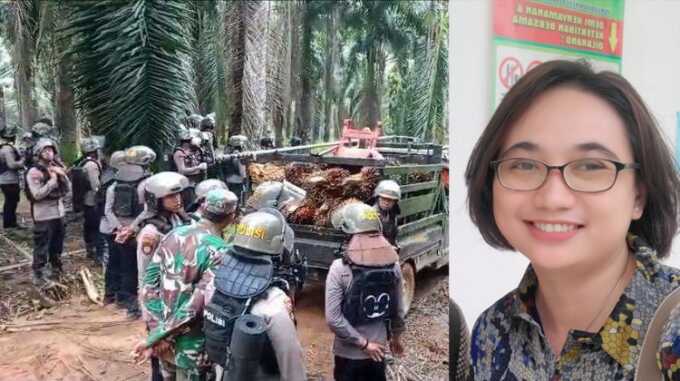Judul : Chairperson of Peradi Palangka Raya Highlights the Still-Pervasive Palm Oil Theft in Central Kalimantan
link : Chairperson of Peradi Palangka Raya Highlights the Still-Pervasive Palm Oil Theft in Central Kalimantan
Chairperson of Peradi Palangka Raya Highlights the Still-Pervasive Palm Oil Theft in Central Kalimantan

PALANGKA RAYA - The phenomenon of palm oil theft and looting in Central Kalimantan (Kalteng) has raised concerns from various parties.
One of them comes from legal expert and Chairperson of the Palangka Raya DPC of the Indonesian Advocates Association (Peradi), Kartika Candrawati, S.H., M.H.
Although the action is considered a crime, Kartika believes this issue cannot be viewed in black and white. She emphasized the need for a more comprehensive and fair legal approach, addressing the root causes that often begin with land conflicts.
She said that although theft is considered a criminal act according to criminal law, many cases on the ground cannot be seen merely as pure crimes.
"The cases of fresh palm fruit bunch (TBS) theft in Central Kalimantan are usually caused by unresolved land conflicts, such as issues regarding land compensation, the plasma program, and partnerships that are not functioning properly. This is what leads the community to take matters into their own hands," explained Kartika on Sunday (7/6/2025).
According to him, the act of theft is explicitly prohibited in Articles 362 to 364 of the Criminal Code. However, in the context of plantations, there are also specific regulations through Law No. 39 of 2014 on Plantations, which specifically regulates penalties for crimes in this sector. "The Plantation Law is the lex specialis of the Criminal Code," he added.
One of the complicating factors in handling this case is when the perpetrator comes from the surrounding community that claims the land as ancestral or customary land.
Regarding that, Kartika encourages a mediation approach as the first step in resolution, rather than directly prosecuting the community.
"The government and law enforcement agencies (LEAs) should first adopt a persuasive approach. Land claims by indigenous people must be proven with good faith; not all can be justified at once," he emphasized.
Kartika also emphasized the importance of transparency from the company. If the company claims to have land legitimacy, they must also be willing to open access to the legal documents they possess.
According to him, many permits currently in circulation do not meet the strong legal standards.
Regarding legal steps, he explained that each party, including companies, has the right to take legal action against thieves. However, he reminded that criminalization of the community or human rights violations should not occur.
"Throughout the legal process, if it is carried out according to the Criminal Procedure Code and based on legitimate evidence, there will be no human rights violation," he said.
She also touched on the role of law enforcement in handling this case.
" I cannot assess the details of how law enforcement has been carried out so far, but certainly, it must uphold the principle of presumption of innocence and provide a fair space for defense for all parties," he said.
In a broader context, Kartika assesses that the state must actively participate in resolving land conflicts that often trigger palm oil theft cases.
"if the government, both central and regional, continues to ignore and not address this conflict, it is feared that it will become a snowball ending in social and security instability," he emphasized.
In closing, Kartika conveyed a message to all stakeholders to prioritize dialogue-based solutions.
"This issue must be resolved from its root. Society is seeking justice, companies want legal certainty, so let's sit together. The government and law enforcement agencies should not be repressive right away, but prioritize dialogue and mediation. And if it must go through the legal process, carry it out fairly and in accordance with existing regulations," he concluded. (ovi)
Demikianlah Artikel Chairperson of Peradi Palangka Raya Highlights the Still-Pervasive Palm Oil Theft in Central Kalimantan
Anda sekarang membaca artikel Chairperson of Peradi Palangka Raya Highlights the Still-Pervasive Palm Oil Theft in Central Kalimantan dengan alamat link https://www.punyakamu.com/2025/07/chairperson-of-peradi-palangka-raya.html
0 Response to "Chairperson of Peradi Palangka Raya Highlights the Still-Pervasive Palm Oil Theft in Central Kalimantan"
Post a Comment